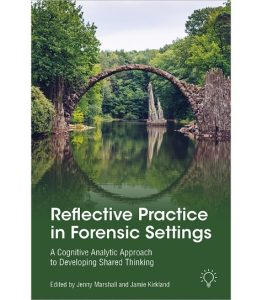Reflective Practice in Forensic Settings

Author:
JENNY MARSHALL is a Consultant Clinical Psychologist at Ridgway Hospital, Tees, Esk and Wear Valleys NHS Trust, and an accredited CAT Practitioner and Supervisor. She has a long history of working in low and medium secure services with people with mental disorders, and she has a strong interest in the application of the CAT model to reflective practice. She works with Catalyse, a social enterprise offering CAT training, therapy and consultancy through a network of expertise across northern England.
JAMIE KIRKLAND is a Consultant Clinical Psychologist in the Division of Forensic Mental Health and Learning Disabilities with NHS Greater Glasgow and Clyde, where he is the lead for reflective practice. He is a CAT Trainer and Supervisor, and co-Director of CAT Training Scotland. He has applied CAT in secure settings and with community learning disability teams, and has a strong interest creating reflective spaces for multi-disciplinary staff teams.
Briefly:
With reflective practice increasingly recognized as an effective way to help staff working in challenging environments, expert contributors explore ways in which a CAT model can enable reflective practice in forensic services at individual, team and organizational levels.
Description:
Working in forensic settings with clients who have histories of damage and abuse can be a demanding, disturbing, thrilling and unique experience. It means building connections and instilling the capacity to think before acting – far more than just providing therapy. At a service level, it requires a compassionate culture that promotes the ability to reflect on complex interpersonal dynamics at all levels of the organization. Cognitive Analytic Therapy (CAT) is an accessible model for understanding human relationships that offers a common language for teams and organizations. Reflective Practice in Forensic Settings brings together a range of clinicians to share their experience and approaches, exploring ways in which the CAT model can be applied to develop reflective practice in secure contexts. Together, they also offer valuable guidance for any practitioner seeking ways in which to develop a more relationally informed and reflective therapeutic service.

